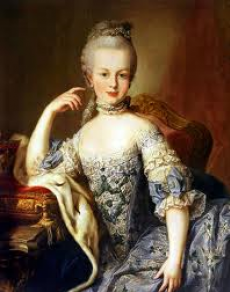
Marie Antoinette, the last queen of France, is a well-remembered figure in history. Known for her lavish taste, her marriage to the French Dauphin and her imprisonment and execution on the guillotine in 1793 her story is widely known and studied. Her link to the French revolution by scholars has made her of great importance in the study of this area, with some scholars being in the belief that her extortionate spending damaged the French economy, causing a financial crisis and unrest in the country. Marie Antoinette’s life was one of style and elaborate yet elegant parties. Born in Vienna in 1755 she was the 15th child of the Holy Roman Emperor Francis I, and so was well accustomed to the life of luxury that she adopted whilst Queen. She was sent to France when she was fourteen to marry the Dauphin Louis, who would soon become Louis the XVI of France. Theirs was not a happy marriage to begin, with it being fairly obvious that they were not very well matched in character or taste. Louis was described as more of an academic character, very intimidated by his new wife. However, after seven years of marriage and much counselling on the matter of children their first child was finally born, Marie, with three more following after. Marie Antoinette’s apparent comments in the early days of the French revolution are what have made her most well-known. When the people of France complained about a bread shortage she was meant to have said “let them eat cake”, which led to a great deal of ridiculing and added to the list of name calling by the French public with names such as “Madame Deficit”. As the revolution in France began to unravel the position of the Royals became more precarious, with a crowd of around 10,000 people gathering at a palace in Versailles demanding that the Royals return to Paris. After a series of failed resolutions, settlements and appalling massacres in Paris the monarchy was abolished and Marie Antoinette and her Husband the King were arrested, eventually being beheaded for treason. Described in both positive and negative lights Marie Antoinette’s legacy is most certainly one of mixed views and opinions. On the one hand she is the epitome of extreme wealth in the monarchy, with gambling, drinking and parties playing a huge role in her life. On the other hand she can be seen as the trigger of a revolution which changed the face of a country.
Image: http://upload.wikimedia.org/wikipedia/commons/8/87/Marie_Antoinette_1767.jpg

0 Comment:
Be the first one to comment on this article.